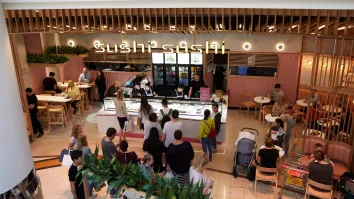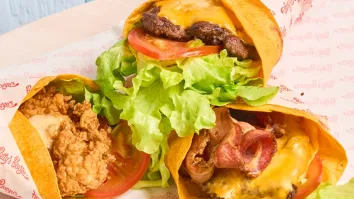
Frictionless physical-digital integration is the next normal for QSRs
Australian QSR brands weigh in on the importance of contactless and frictionless experiences.
While some Australian QSRs were already deploying digital solutions pre-pandemic, many did not expect the innovations required to meet a sharp rise in demand over the last year.
However, with many brands now catching up in contactless and frictionless customer experiences, it has become even harder for QSRs to stand out. Today, what is needed is a unique combination of solid leadership, speed, agility and forward-thinking, so that QSRs offer the best experiences on every channel.
One step ahead
Banjo’s Bakery already had this in mind when they launched Australia’s first-to-market bakery ordering app last year. Not only is the app a means for customers to order their products, it has also become a source of valuable insights on how Banjo’s can further optimise their operations and elevate customer experience.
“Banjo’s Bakery Café has been intentional about challenging the traditional bakery model by creating an offering that caters to hustlers on the go and those desiring a dine-in café experience. Continuing to stay ahead of the curve with our drive-thru stores, Ordering App and delivery availability already in the works pre-pandemic placed our stores in good stead to navigate the challenges posed by COVID-19,” said Jessica Saxby, CEO, Banjo’s Bakery.
Betty’s Burgers and Merlo Coffee, for their part, had dedicated in-house teams ready to take their products and services online. Betty’s Burgers’, for instance, was halfway through the development of their own ordering app when COVID-19 struck. Despite limited marketing, the app has been downloaded 140,000 times by customers who wanted to order ahead and access special online offers.
Judd Sandwell, Chief Operating Officer, Ferguson Plarre Bakehouses said that their restaurant was in a similar position as the other QSRs. COVID-19 accelerated their digital strategy, which was already in place with a new website and new partnerships with aggregators like UberEats.
Pandemic pain points
Despite having most of their tech in place, many QSRs still experienced some hiccups in adjusting to the new normal. They realised that they need a more integrated approach to digital solutions, such as a centralised payments system that features cross-platform flexibility and efficiency.
David Holt, general manager, Merlo Coffee said that they initially had a reactionary plan to the unknowns brought about by the pandemic. According to him, they were building the plan day by day, always ensuring that they were scaling up and down strategically. For example, they had to shift their focus to online sales, which were up significantly, in contrast to the bleak situation around wholesale trade.
QSRs also observed reluctance from franchisees, who were unsure about partnering with aggregators and delivery apps. Sandwell from Ferguson Plarre Bakehouses said that this lasted only a while, as franchises immediately saw their early adapting peers perform well and decided to go onboard.
“With any new business undertaking, there are always learnings along the way; particularly when implementing new technology,” added Saxby from Banjo’s. According to her, their key priority has been to ensure the safety of all customers by implementing a wide array of accessible options, such as additional drive-thrus in Queensland and offering Click & Collect services at all stores.
In response to the common challenges of offering flexible options and experiences, many QSRs adopted a unified commerce approach to their business. This means having a single view of the restaurant’s operations, from the kitchen to payments, in order to make informed and agile business decisions.
As the pandemic began, Australian gourmet burger chain Grill’d had just embarked on its digital transformation. Within weeks, Grill’d was able to pivot its business by tapping into Adyen’s payments platform to enable its delivery service as dine-in restrictions kicked in.
The partnership between Grill’d and Adyen focused on the full customer journey, leveraging Adyen’s unified commerce capabilities to retrieve customer data, facilitate orders, and reduce friction at checkout points and online platforms. For Adyen, the key insight is to recognise the customer, their preferences or their location, and whether they're online or in a restaurant – not only to connect the online and in-store journeys, but to encourage customer loyalty and help Grill’d deliver above and beyond customer expectations.
“I think the next phase is going to be about integrating that in-store environment with that online world and kind of giving customers a tailored and personalised experience,” said Caitlin Caldwell, former Program Manager at Grill’d.
Channel-agnostic QSRs
Unified commerce also allows customers to move freely between channels, oftentimes a smartphone, a laptop, or a physical store. At the core of this approach is a single payments system, which has been found to bring restaurant savings of up to $5.8 million over three years.
A report by Adyen highlights how the best businesses implement unified commerce by combining their physical and digital offerings to create an unparalleled customer experience. The question is, what does this exactly look like for QSRs?
Troy Mcdonagh, managing director at Betty’s Burgers, said that it is paramount for QSRs to implement fully integrated systems. It is through these strategies that Betty’s Burgers was able to pivot and scale their service channels, “All our digital channels interface directly with our in-restaurant operational technologies, so the adaptation has really been seamless,” he added.

Troy Mcdonagh
For Merlo Coffee, this meant reimagining their retail stores and utilising them as takeaway hubs where customers could purchase essential items like fresh bread, milk, and pasta. They then focused their e-commerce store on bringing premium coffee to their customers’ doorsteps.
"Customer experience remains the most important battleground for QSRs, particularly in Australia where competition is fierce and people are doing more on their own terms, whether that's grabbing coffee before they head to work or indulging at home with a pizza delivery. Brands need to serve customers the way they want – and that's even more challenging in these times," said Hayley Fisher, Adyen’s country manager for Australia and New Zealand.

Hayley Fisher
In an increasingly digital world where customers want to be served when and how they want, with safety as a priority, QSRs need to develop strategies that align their physical and online offerings. By tapping into unified commerce, QSRs can offer a “next normal” kind of experience that is truly frictionless.

























